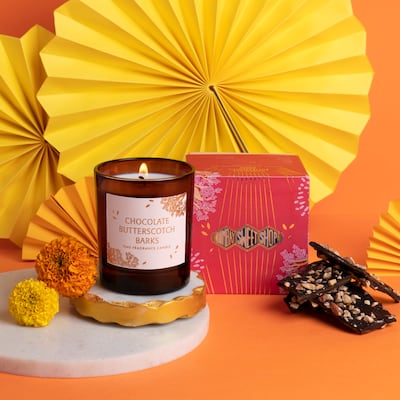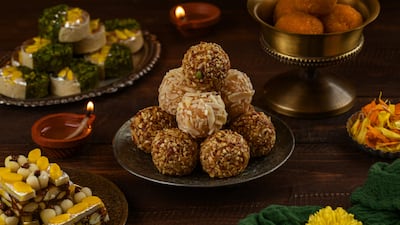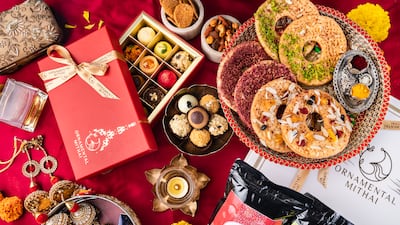“Imagine Willy Wonka had a mithai factory. What would it look like?” Sameer Seth’s enthusiasm when it comes to Indian sweetmeats borders on the wondrous. The co-founder of Bombay Sweet Shop even labels the preparation of soan papdi and boondi as “magical”.
Boxes of mithai have traditionally been the gift of choice for countless Indians the world over for any and all special occasions, from buying a new car to welcoming a new baby. Festivals such as Diwali meant a roaring trade for sweet shops and their hard-working halwais, or sweetmakers. However, there has been a shift in India’s gifting culture in the past two decades, with people veering towards chocolates, macarons, flavoured dry fruits and wines.
“A lack of appreciation for traditional mithais aside, poor quality of ingredients – think adulterated milk or milk substitutes, low-quality ghee and Dalda (a ghee brand) to bring down the costs, high quantities of sugar – resulted in a loss of audience,” says Kainaz Contractor, co-owner of Bhawan, a street food brand in Delhi. “Offering the same kinds of mithais, too, was a problem.”
Not to be deterred, entrepreneurs such as Seth, Contractor and others began to offer a modern take on traditional mithais, in a bid to reinvigorate the country’s waning interest in Indian sweets. Discerning customers can now delight in laddoos made of sesame and white chocolate, pedas in Nutella flavour or infused with vanilla and a blueberry stuffing, coffee mohanthal, coconut-orange barfi and cashew marzipan bonbons with chocolate ganache.

“We are trying to combine a little bit of French patisserie with Indian mithai,” says Arvind Dadu, who envisioned revamping the menu when he took over the reins of Anand Sweets & Savouries in Bengaluru in 2001. Today, the shop offers more than 200 variants of traditional and modern Indian sweets, from cashew fudge to edible fruit leather.
At Mumbai's aptly named Ornamental Mithai, founder and chef Neelam Saini-Sircar creates limited-time mithais for festive occasions, such as variants of mathri for Karwa Chauth festival and ghevar for Teej. The Peshawar mathri comes with saffron and 24K gold topping, the rose mathri is dunked in rose syrup and topped with dehydrated rose petals, and the tiramisu ghevar is dipped in coffee and garnished with a generous helping of kalakand, coconut and choco chips. “We eat with our eyes first, so the look and feel of the product should appeal to people. We want to get that respect back for Indian mithais,” says Saini-Sircar.
Offering seasonal and customisable menus dictated by hygiene, quality ingredients and innovation, these luxury sweet brands are elevating the mithai experience. Personalisation is another facet they are exploring, especially for weddings. “We set up a tasting session with clients to understand their needs and flavour profile,” says Saini-Sircar.
If the mithai is the piece de resistance, the packaging, too, is no less a work of art. “Our festive packaging includes hard boxes with compartments and gold foiling for maximum visual appeal,” says Contractor. “Earlier, people would serve mithai on a platter, but today, our exquisite boxes sit on their table or in the living room,” says Dadu.

While boutique sweet marts want to shed the stodgy feel of traditional Indian sweets, Contractor says it is best not to “mess around with a lot of the techniques of mithai-making. Our process of inventing new flavours is quite organic and involves brainstorming with our in-house halwai, who breaks down the process of mithai-making. We then sit together to understand the flavour profile and the ingredients that will pair well.”
At Anand Sweets, a team of food technologists work closely with chefs to conceive new treats. Before any product hits the menu, it undergoes numerous rounds of trials.

Meanwhile, chef Girish Nayak from Bombay Sweet Shop travelled for two years across the length and breadth of the country to understand the culture and method of making traditional Indian sweets. “It took Nayak six months to figure out how to make chocolate boondis,” says Seth, referring to the brand’s popular dark chocolate ladoo flavoured with coconut.
Patrons can even watch the mithai-making process behind glass partitions at Bombay Sweet Shop, where the latest creation is a multilayered candy bar called coconut caramel patissa fingers, with a flaky and crunchy bed of soan papdi, light-as-air coconut fluff, pepper caramel dipped in chocolate and finished with gold dust.
Unlike conventional Indian mithais that are sold by the kilogram, new-age sweetmeats are sold by the piece, encouraging clients to indulge in variety. Also on offer are gluten-free, vegan and nut-free options catering to various dietary conditions, while the use of jaggery, fruit infusions and dates in lieu of white sugar appeals to increasingly health-conscious folks.
“Our variations of mithai cakes – kalakand cake, pull-me-up rasmalai with a liberal drench of rabdi, and jalebi cakes – are a huge hit with folks who like to gift their parents and grandparents cakes that do not contain chocolate,” says Contractor.
“Traditional mithais are high on sugar and it becomes difficult to have more than one,” says Seth. “We have toned down the sugar levels, tweaked in other flavours like a citrus element or salt, and applied different techniques to achieve a balance.”
With Diwali around the corner, the shop has also developed a range of gourmet merchandise, from mithai-inspired playing cards to chocolate butterscotch candles.
Willy Wonka would have been proud, indeed.

